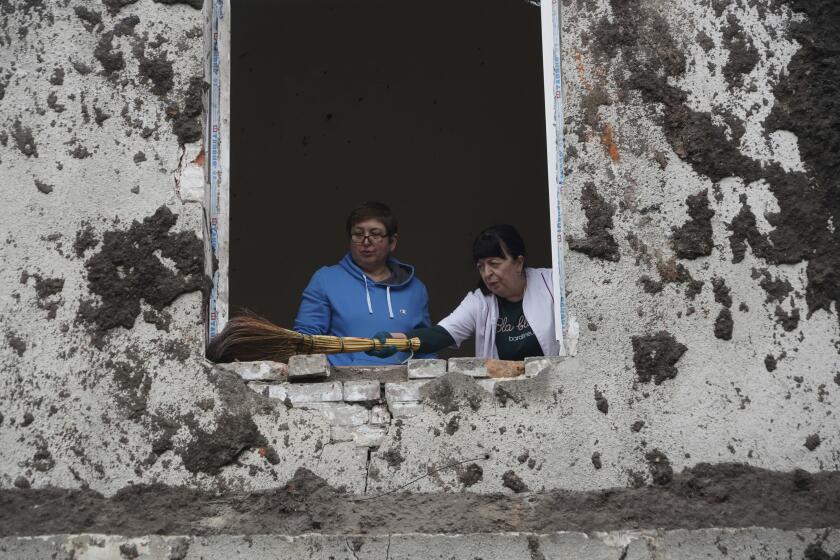With Rebel Leaders at His Side, Reagan Presses for Contra Aid
With a critical congressional vote just two weeks away, President Reagan escalated his rhetoric Monday in an effort to gain support for his $100-million aid package for the guerrillas fighting the Sandinista government in Nicaragua.
With three rebel leaders at his side, Reagan told a group of conservative supporters in the Cabinet Room that defeat for the guerrillas--the so-called contras-- would create “a privileged sanctuary for terrorists and subversives just two days’ driving time from Harlingen, Texas.”
The contras present were Adolfo Calero, head of the Nicaraguan Democratic Force; Arturo Cruz, a former Sandinista ambassador to Washington, and Alfonso Robelo, a former member of the original Sandinista junta. All are now leaders of the United Nicaraguan Opposition.
In a briefing for reporters, Elliott Abrams, assistant secretary of state for inter-American affairs, said that thousands of disaffected Nicaraguans are “waiting to fight” if the United States equips them to counter the sophisticated Soviet weaponry recently delivered to the Sandinistas.
Abrams said that the contra force, which currently numbers about 6,000 active combatants, would swell to 25,000 if Reagan’s aid package were approved. He said the number has declined by about 2,000 in recent months because of a shortage of supplies.
Recalls Hungary’s Fate
“If we don’t provide our friends with the means to stop the Soviet gunships, Nicaragua’s freedom fighters will suffer the same fate as the Hungarian freedom fighters did 30 years ago,” Reagan said.
The President faces a skeptical Congress as he seeks to broaden U.S. involvement with the contras to include substantial military aid, particularly because only a third of the humanitarian aid voted last year has actually gotten through to the combatants in the field.
Reagan is asking Congress for $30 million in humanitarian aid and $70 million in military assistance.
Abrams blamed Congress for making it “logistically hard” to get last year’s $27 million humanitarian aid to the contras. He said that neighboring countries are “scared of the Sandinista buildup” but would be more willing to cooperate if the aid were being delivered “in a more discreet manner.”
The Administration would like Congress to give it complete discretion in funneling military aid undercover into Nicaragua, a move that Abrams said would make it easier for Nicaragua’s nervous neighbors to quietly support U.S. policy.
Afraid U.S. Will Walk
“What they’re afraid of is we’re going to walk away from this and leave a Soviet government armed to the teeth that will then take off after them,” Abrams said. “They’re very much afraid of the Soviets and afraid we’re not going to stick with it.”
The House is expected to vote on Reagan’s request March 19. However, of the four House committees reviewing the package, only the Armed Services Committee is expected to vote for it.
Rep. David McCurdy (D-Okla.), who last year organized a group of Democratic congressmen who provided Reagan his margin of victory, announced Monday that he will oppose the $100-million proposal because he contends that the Administration has made no effort to negotiate with the Sandinistas.
Assessing current support for contra aid in the House, McCurdy said: “I actually think they have lost ground. The shrillness of their argument has driven votes away.”
‘A Full-Court Press’
Reagan promised the contra leaders in an Oval Office meeting that he will mount “a full-court press” for his aid package. White House spokesman Larry Speakes said Reagan is likely to take his case directly to the American people in a prime-time television address sometime before the vote in an effort to pressure Congress.
The President and the contra leaders said they have sought a diplomatic solution but that the Sandinistas are not interested.
“We want a real two-track approach that will seek a political solution,” said contra leader Robelo. “But the Sandinistas will never look into the political situation seriously unless they have the pressure.”
Times staff writer Sara Fritz contributed to this story.
More to Read
Start your day right
Sign up for Essential California for news, features and recommendations from the L.A. Times and beyond in your inbox six days a week.
You may occasionally receive promotional content from the Los Angeles Times.






